
Stone Washington

“Black Americans have made the greatest gains over some of the highest hurdles, in the shortest period of time, than any racial group in the history of mankind. Now the question before us is: how can we make these gains available to a large percentage of the black community for whom they appear to be elusive?”~Dr. Walter E. Williams
RIP Dr. Walter E. Williams—remembering my connection to this legendary figure
Dr. Walter E. Williams (March 31st, 1936—December 2nd, 2020) was an iconic intellectual, iconoclastic scholar and towering figure in the realm of economics. He stood as a staunch defender of the U.S. Constitution and the free market, dedicating his research to advocate for economic solutions grounded in laissez-faire capitalism. Dr. Williams spent most of his professional career teaching economics at George Mason University, where he would eventually reach Emeritus status and be honored as the John Olin Distinguished Professor of Economics. Upon passing away in Arlington Virginia on December 2nd, 2020 at the age of 84, The Washington Post provided a detailed obituary of Dr. Williams that read in-part,
“Walter E. Williams, an economist and writer who was one of the country’s leading Black conservative public intellectuals, known for his outspoken views that included opposition to the minimum wage and affirmative action programs in colleges, died Dec. 2 in Arlington, Va. He was 84.
The death was confirmed in a statement by George Mason University, where he had taught since 1980. According to university spokesman Michael Sandler, Dr. Williams taught a graduate course in microeconomics on GMU’s Arlington campus that ended at 10 p.m. on Dec. 1. Several hours later, police found him unresponsive in his car in a university parking lot. He reportedly had chronic obstructive pulmonary disease.”
Dr. Williams was a leading Black libertarian scholar, highly acclaimed for his hard-hitting criticism of Affirmative Action, Social Security, Medicare, Medicaid and other welfare dependency programs of which he called “legalized theft”. At the same time, Williams charted a revolutionary path of success in race-relations, economics, and governmental authority. Known for his critical thinking and independence, Williams chose not to belong to any political party, instead viewing himself as a Jeffersonian Liberal or Madisonian Conservative with views aligned with Jefferson’s Democratic-Republican Party. With over 10 published books, including “More Liberty Means Less Government”, “Liberty vs. the Tyranny of Socialism”; “Up From The Projects: An Autobiography”; “Race and Economics: How Much Can Be Blamed On Discrimination?”; and “The State Against Blacks”, he was a very prolific scholar. Williams also wrote over 150 publications featured in a host of scholarly journals such as the Social Science Quarterly, Economic Inquiry, American Economic Review, and the Cornell Journal of Law and Public Policy. Williams has also regularly substituted for Rush Limbaugh on his award-winning syndicated radio show.
My personal connection to Dr. Williams grew from my father, Professor Ellis Washington, instructing me to reach out and meet him during my freshman year at George Mason University. My father had known Dr. Williams since 1994 when he graciously put him in touch with the Publisher of The Social Critic journal, C. James Newlan, who would become a dear colleague of my father’s and the first publisher to place faith in him as a scholar worthy of public notice. As a further show of support, Dr. Williams helped my father become a writer for World Net Daily (WND) in 2007, where he had been a weekly syndicated columnist for many years. Please find the time to read my father’s crucially important and recently published article, in memoriam of Dr. Williams’ life and legacy.
While I only spent a year studying at George Mason University before transferring to Clemson University my sophomore year, Dr. Williams remained a dedicated guide and intellectual resource for me during my time there. I would be courteous of Dr. Williams’s busy schedule, only dropping by his office hours every 2-3 weeks when he had the time to consult with me. He was always very gracious and welcoming of me whenever I came by to speak with him, providing me with useful tips about successfully navigating college for the first time. Dr. Williams would also serve to be a pivotal link for me to arrange a luncheon with my intellectual mentor Justice Clarence Thomas, who was good friends with Williams and often conversed together at the Hard Times Café in Fairfax Virginia. This relationship laid the perfect foundation for me to facilitate a meeting with the two intellectual giants at the same venue on December 13th, 2016, where I solicited the help of my father’s already strong connection as a mentee to Justice Thomas and his wonderful secretary.
The conversations we shared had an incredibly profound impact on my intellectual development and was worth the expense paid for me to personally fly down to Washington D.C. for a day amid my Christmas vacation during my sophomore year at Clemson University. In line with how I’ve been raised, I respected the timely wisdom and experience of the elders in my presence, opting to mostly watch Justice Thomas and Dr. Williams carry the focus of the conversation, while only contributing when appropriate. Just hearing the wealth of knowledge and reservoir of wise advice from these two giants of conservatism was nearly more profoundly inspirational to me than most of the teachings I’d received up to that point in my college studies! They also both reinforced several timely lessons that my father had passed down to me in times past, including to always supplement my college readings with outside scholarly literature, and read publications by my Professors that were not assigned in class, as a means of broadening my understanding of the worldview and academic interests of those who taught me.
Invaluable lessons like these would serve to deepen my undergraduate experience, provide me with new perspectives, and broaden my academic development beyond the confines of the classroom; something many students fail to do. After the long debate that we shared, Dr. Williams was kind enough to give me a ride to the U.S. Supreme Court, after Justice Thomas generously arranged for me to embark on a special tour of his chambers and the building. After parting ways with Justice Thomas in the parking lot, who had personal matters to attend to, Dr. Williams drove me in style from Fairfax to D.C., riding in his luxurious Lexus sedan. For that time, we shared a wonderful conversation that further memorialized the mentoring lessons that Dr. Williams imparted to me that day. The unprovoked generosity that Dr. Williams embodied was perhaps a powerful characteristic that not too many people were aware that he possessed, and something that I will forever appreciate about him. I now find it appropriate to transition toward my examination of some of the key elements of Dr. Walter Williams’s background as portrayed in his inspirational documentary, “Suffer No Fools”.
Suffer No Fools: the untold story of Dr. Walter Williams
Powerful quotes such as “The welfare state has done to black Americans what slavery could not have done, Jim Crow and the harshest racism could not have done – namely to destroy the black family”. Another meaningful quote was, “Government cannot create a special privilege for one American, without simultaneously creating a special disadvantage for some other American.” In the documentary both of these statements encapsulated the essence of Dr. Williams’ Libertarian philosophy and his disdain for the failures of the big government federal welfare state. Dr. Williams was remembered as someone who rose early to take on the day and stayed late, while always being prepared to capture success in life when “the opportunity train comes along”.
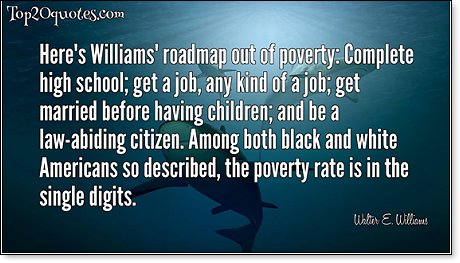
WALTER WILLIAMS: “Black Americans have made the greatest gains over some of the highest hurdles, in the shortest period of time than any racial group in the history of mankind. Now the question before us is: how can we make these gains available to a large percentage of the black community for whom they appear to be elusive?”
Dr. Williams had been referring to the large portion of struggling Blacks who lived in poverty and/or were dependent on welfare expenditures from the government. The documentary depicted Williams’ primary passion as the teaching of college economics, where he had taught continuously at George Mason for over 45 years. Speaking to my interest in the law, Dr. Williams gave an informative lesson to an auditorium of students that incorporated aspects of property rights to simple financial exchanges at the grocery store, where he used the example of a cashier granting title to a customer buying a gallon of milk, in exchange for the customer granting title to three dollars for the milk. The titles having been exchanged is the equivalence of the transfer of property rights.
Dr. Williams grew up with his sister and mother in federal funded housing, barely making ends meet with the little gained from his mother’s job as a part-time domestic servant. Williams’ father was rarely in his life, but did provide minor financial support to help the family get by in the projects of North Philadelphia. While Williams’s mother never graduated high school, she was the foundation of support for the family’s preservation and provided all that she earned to keep them alive through difficult times. Williams would become the first person in his family to graduate high school and attend college. While his father was largely absent in his life, Williams’s mom would eventually get remarried in 1958 and the man whom Williams referred to as “Pops” would serve as a father figure to him, teaching him useful lessons in manhood.
WALTER WILLIAMS: “What I mean by spiritual poverty is where people lack the ambition. They’ve developed the ideas of dependency, and they’re engaging in all kinds of pathological behaviors, such as the high illegitimacy rate where 70-some percent of black kids are born out of wedlock. And it was like, in 1940, it was only 13 percent.”
Addressing this issue of spiritual poverty, AEI Fellow Charles Murray states that one must first reform this pre-existing culture before you can effectively solve the problem itself. In the documentary, Dr. Williams protested restrictive labor laws in the United States, beginning with his first public documentary in 1985 where he attributed such laws to crippling the progress of the 70% of Black youth in ghettos unable to find a job. Starter jobs such as the ones in which Dr. Williams had as a young adolescent polishing shoes or serving food at the Horn and Hardart in Philadelphia were invaluable ways in which he could learn to become a skilled worker in the future. Where kids cannot learn these skills from their schools or violent neighborhoods, Minimum Wage laws serve to unfairly drag struggling kids down.
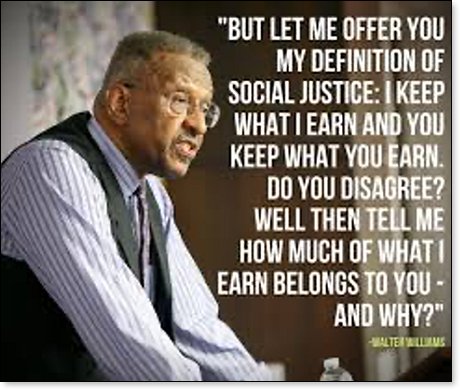
Williams would eventually meet his wife Conchetta “Connie” Taylor while paying his way through college at Temple University, where he worked part-time as a taxi driver. She was described as someone who was level-headed and a calming force to keep Dr. Williams under control. Williams would later be drafted to serve in the U.S. military, receiving advice from his stepfather Pops, who had served as a Tech Sergeant during World War II, that "Being in the army is a million-dollar experience that you wouldn't take a million dollars to do again.” Dr. Williams would often stir up trouble in his army base at Georgia in the midst of segregation in the south, viewed as unpopular by black and white soldiers. Williams would work his way up to become court recorder, learning military law which he used to defend himself against trumped-up charges of failing to follow a direct order in a court martial. He was found not guilty on all charges, and before considering legal retaliation against his captain who wrongfully accused him, Williams was shipped out to serve in South Korea. Prior to leaving, he would propose and marry Connie. He served for two years before writing President Kennedy in 1965 to protest the unfair nature of blacks working to serve the United States in the military under empty promises of freedom and equality. He would soon after be approved for an honorable discharge and sent back to the United States.
Not too many people realize that Dr. Williams held some radical views on the civil rights movement, having been much more of a supporter of Malcolm X than Dr. Martin Luther King, and embracing violent retaliation over peaceful protests when threatened by white racism. While studying at Cal State during the height of the civil rights movement, Dr. Williams found himself inspired to study economics when he read the work of W.E.B DuBois, who argued that Blacks will never truly be a free people if they fail to understand how to make the economic system in America work for them. To this point of Blacks needing to be self-reliant entrepreneurs, Frederick Douglas gave a stark warning to members of his race, “learn trades or starve”. Many such black Americans took this advice in stride and exploited the market system for the benefit of both themselves and white Americans. Such black men mentioned in the documentary include, Warren Clay Coleman of Coleman Textile Manufacturing Co., Junius G. Groves—former slave turned largest potato farmer in the country, and Thomy Lafon—who became a millionaire investing in real estate in New Orleans. Blacks made a great deal of progress, even in the face of harsh obstacles like states passing laws to restrict competition among black entrepreneurs to keep them from advancing in the market. “And this is why the people who are for discrimination are also against markets,” Dr. Williams said, “because they know markets tend to be color blind.”
After graduating from Cal State with a bachelor’s in economics, Dr. Williams would enroll in UCLA’s top-12 graduate economics program at the behest of one of his professors. After obtaining his master’s degree, Williams found that he really loved teaching and became a teacher at Los Angeles City College. And with the inspiration of famous economist philosophers like Friedrich Hayek and Milton Friedman, and the guidance of tough-minded mentors like Larry Kimball and Armen Alchian at UCLA, Williams would enroll into a PhD program in economics at UCLA. It was through this program that taught Williams to think with his head and not with his heart, allowing him to land a full-time professorship at Cal State University. It was noted in the documentary that when Dr. Williams left Cal State to work at Temple University, he took issue with the existence of affirmative action that reinforced racial stereotypes and served to set many blacks behind during a time when blacks had been advancing on all cylinders between 1950-1965. The “equal outcome” mindset emerged during LBJ’s presidency and produced many unintended consequences to greatly hinder blacks, even when they had already been advancing to success prior to such programs.
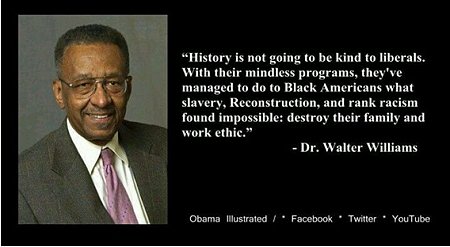
In 1975, Dr. Williams and his wife would move back to California where he pursued a 1-year fellowship at Stanford University’s Hoover Institution. It is here that Williams most likely crossed paths and met his good friend Dr. Thomas Sowell, a renowned economist who continues to be one of the most well-known fellows there. It was during this time that his daughter Devon was born. And it is here that Dr. Williams unveiled his minimum wage study that exploited the downsides to minimum wage laws in America, particularly how they disadvantage Black teenagers seeking to earn a living. This launched Williams into the public eye, where he was interviewed on radio and TV extensively, even invited to testify before Congress on various aspects of labor and economics.
The documentary does well to display Dr. Williams’ unyielding love and respect for the U.S. Constitution, where he shares a passionate conversation with senior judge for the United States Court of Appeals, Douglas Ginsburg. For Williams, he believed that the promise of the Founding Fathers to "promote the general welfare" and "secure the blessings of liberty" has largely been ignored by regular Americans, elected members of Congress, and unelected justices on the Supreme Court. As the documentary concludes, I found one of the final quotes by Dr. Williams’ daughter, Devon Williams, to be very evocative of the image of the intellectual independence and lone critical thinker that speaks to all that Dr. Williams stood for, despite the difficulties and discrimination he faced as a black academic,
DEVON WILLIAMS: “You can be principled and un-flexing, unbendable with your principles and still be successful. And sometimes you have to stand up, and it's okay if you have to stand alone. And I think that that's an un-intentioned message that he sends. Sometimes you have to stand alone, but at least you're standing up.”
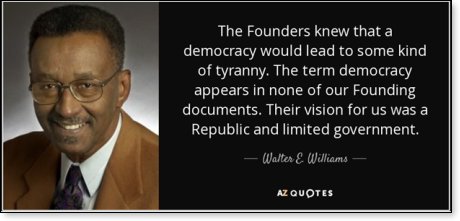
Epilogue and Eulogy for Dr. Walter Williams
In concluding, I would like to reemphasize how much of an influential intellectual, a titan of libertarian economics, a lover of the Constitution and America’s founding principles that Dr. Walter Williams was. For the 4 years that I knew him, he helped transform me into a deep thinker, providing me with timeless wisdom and advice that has helped me excel in my undergraduate and graduate college education. I am so grateful to my father for encouraging me to meet with Dr. Williams during his office hours on a regular basis, even if just to stop by and provide a brief progress report about my academic progress at George Mason. Despite being very busy, Williams was always very welcoming and an engaging person to speak with, providing me with just the right advice I needed to stay on track during my first year in college.
It was through my unforgettable meeting with Dr. Williams and Justice Thomas a year later that would help propel my critical thinking to greater heights, while also inspiring me to hold strong to my conservative beliefs in the midst of a progressive environment in academia, even if “I have to stand alone”, as Devon Williams said in the documentary, “at least you’re standing up”. This wisdom reigned true to me particularly during that time when two months prior to that December meeting, in October 2016, I was the only person in my political science classes to rightfully predict that Donald Trump would win the presidency in the 2016 election against Hillary Clinton. Even against my mentoring professors at Clemson, Drs. Bruce Ransom and David Woodard, I held strong to my conservative convictions that Trump was destined to ascend to the presidency during a time when millions of Americans struggled so terribly under the final year of Obama’s outgoing term in office.
Having Dr. Williams as an intellectual mentor, even if only for a few years, represented an incredible honor for me to blossom as an emerging scholar and critical thinker, and I vow to always carry-on Dr. Williams’s timeless lessons conveyed to me in our conversations, his inspirational documentary “Suffer No Fools”, and the enlightening teachings made through his published works. May Dr. Williams rest in eternal peace, praying that he rests in comfort with the Lord Jesus and His angels in heaven.
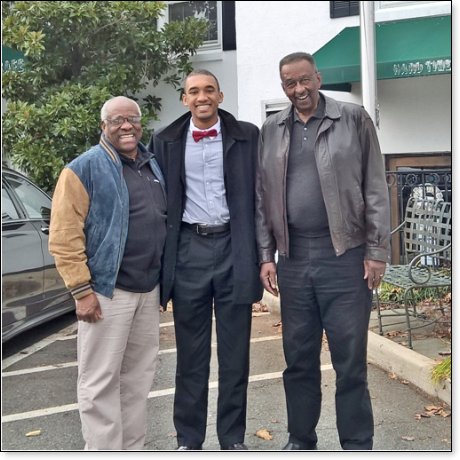
The views expressed by RenewAmerica columnists are their own and do not necessarily reflect the position of RenewAmerica or its affiliates.




















